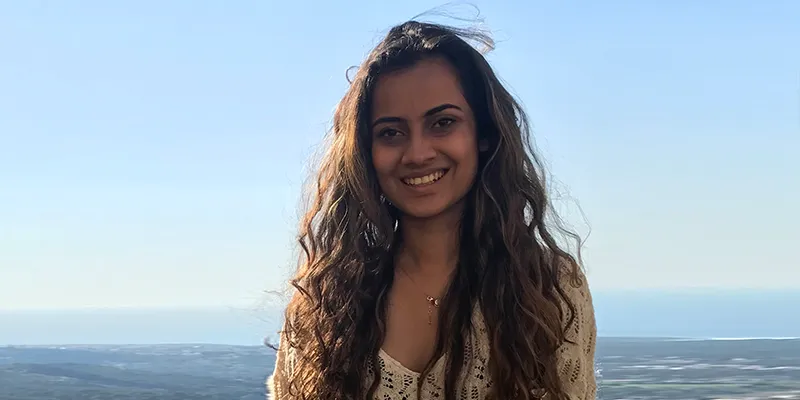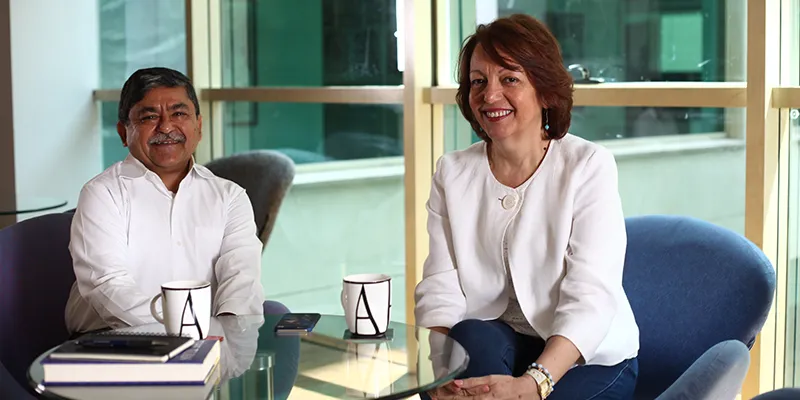Rejected 15 times and now a best-selling author – the incredible story of Ratna Vira
Ratna Vira, daughter of celebrated journalist Nalini Singh, is one of the first Indian authors to have co-authored a book in English with her daughter. In a chat with YS Weekender, Ratna takes us behind the scenes, telling us about her work and sharing some candid tales about her family.
Often, rejection, deceit, and the harsh realities of life tend to become our greatest teachers. Writers, in fact, dig into these corners every now and then for inspiration. And as a writer, whose books hold up a mirror to society and expose its many underlying hypocrisies, author Ratna Vira is well-acquainted with this truth.
Ratna, the daughter of celebrated journalist Nalini Singh (she is also related to journalist-turned-politician, Arun Shourie), knows very well what it’s like living under public scrutiny. She has even courted controversy many a time. All these shades of her collective experiences reflect deeply in her work.

Author Ratna Vira
Her first book Daughter by Court Order, a reflection of society and the way daughters are treated in families, became an instant success when it came out in 2014. Later in 2016, Ratna penned her second book, It’s Not About You, where she highlighted the issue of bullying and the emotional upheavals that it sparks.
After two back-to-back successful releases, the author has now published her third book, Why People Give: Interpreting Altruism – which was co-authored with her daughter, Suhasini Vira. Inspired by the founders and trustees of Genesis Foundation, Prema Sagar and Jyoti Sagar, the book delves into the need for empathy in our times.
With the official launch of the book happening on September 10, Ratna takes us behind the scenes. From researching the subject to the experience of co-authoring a book with her daughter, she reveals all in candid chat with YS Weekender.
Edited excerpts from the interview
YSWeekender: What is the inspiration behind your book, Why People Give: Interpreting Altruism?
Ratna Vira: I write for my children, Suhasini and Shauryya. And this book is special because I have written it with my daughter, Suhasini, who is the co-author of this book.

Suhasini Vira
A chance meeting with Prema Sagar, close to Christmas a few years ago, was a catalyst for the book. I had personally seen the distortion that greed and avarice can bring. I know the near devastation that you can feel when you discover that people lie and steal, even in the most sacred relationships, believing that it is their right to trample over your dreams and those of your children. Patriarchal attitudes were cloaked under layers of sophistication but reared their ugly head in my life. People forget that coffins have no shelves, and that karma catches up.
So, when Prema started our conversation by whipping out her mobile and showing me photographs of children, with unique stories, I sat mesmerised because the joy on the faces of those children concealed some very real problems. She showed me several photographs of these children who seemed to have captured sunshine, because they smiled with their eyes … and I was hooked.
There was a boy who had until recently been on a ventilator battling for life but was grinning broadly. Another child knew she was going for a surgery in the coming weeks but was enjoying the moment. I heard about a mother who had lost her first-born child but was determined to reach out and help as many little children as she could.
YSW: Emotions like hope, empathy and optimism seem to be the dominant themes in this book. How did you treat these layered emotions?
RV: In the preface I address this, when I write on empathy, which seems to be at an all-time low. Here’s my answer, quoting from the book,

“I have learned to be an observer, to watch and see what people do and what their motivations are. I watch the world spin and feel breathless, everyone is in a hurry. Money is a number and people are just social media profiles. I feel intimidated by the explosion of information but do not voice my doubts, convinced that other people may feel differently. And as I grow older, I find that I am pulled more and more to the past.”

YSW: Tell us about your association with the Genesis Foundation. What were your key discoveries while researching about the foundation and the founders Prema Sagar and Jyoti Sagar?

Jyoti Sagar and Prema Sagar
RV: I have, over the past three years, met Prema and Jyoti many times. To hear them speak about their work is truly moving. Each child that they save is special for them. They speak lovingly about each case. I realised that it is a privilege to help another human being, but to save a life, is near godliness.
In a world, where nothing seems to move us, where most people are immune to each other’s suffering, it was an emotional journey for my daughter and myself.

One of Suhasini’s favourite quotes is, “Do all the good you can, In all the ways you can” (John Wesley, 1703-91). And this kept us going when we hit a dead end and the readings seemed endless.

YSW: What made you foray into writing about women? Do we get to see shades of personal experience?
RV: When we are confronted by harsh facts, rejection and deceit are often the emotional reservoir that writers and artists dip into for inspiration. I was no different. My children are my muse. I began to write Daughter by Court Order for them to describe the India I had grown up in, the societal attitudes that had shaped me and influenced my writing.
Aranya, the protagonist in the book, loves her children Sia and Shrey as much as I do. She promises her daughter, “your story will not be mine.” Aranya has been crushed by her influential mother, with support from her brother and sister-in law Dolly. She hero worships her mother’s older brother and is broken when she discovers that he too is a monster.

This is not new but what I brought out is the hypocrisy in the upper echelons of society.

YSW: Being the daughter of a celebrated journalist and being related to a famous family must have attracted a great deal of public scrutiny. How did you deal with all the attention growing up and even now? Do you feel it interferes with your own success?
RV: My mother is, in your words, ‘a celebrated journalist’. My uncle, her older brother, is journalist/politician, Arun Shourie. My mother’s family is small, and I thought we were close knit, but there were things that I did not know. Actually, I am sure that my brother Sukaran Singh and his wife Sonia Pahwa, would be better suited to answer your question. For my mother has always adored my brother and his wife.
For them, he is their entire world. I was loved by my nani, but I found that often I was the daughter who was never mentioned. As for success, I am grateful to the universe for keeping my children and myself safe.
YSW: What’s your relationship with Suhasini like? How did her contribution shape the story telling for, Why People Give: Interpreting Altruism?
RV: I love, actually adore, both my children, Suhasini and Shauryya. They are amazing and I am blessed. Suhasini is my daughter and my friend. Roles have now reversed, where she is now protective of me, while remaining my strength.
YSW: What does storytelling mean to you? Is being a writer what you truly wanted to be? What kind of challenges did you face putting together three successful books?
RV: Today, storytelling is a way of life. I see stories everywhere. In fact, I believe that everyone has a book in them. So, if every life is a story … ‘what kind are you scripting for yourself,’- this is the question that I often ask people, during the creative writing workshops that I run.
I did not see myself as a writer before I wrote my first book. I spent several years in the corporate world and that is where I felt I belonged.

Life happened and I was forced out of work and I turned to writing. My first book, Daughter by Court Order, was rejected fifteen times before it got published. And then there was no looking back. The book made it to several bestseller lists and even The New York Times wrote about the issues I raised in the story.

Each book requires research and that has been different for all three. For instance, in my book, It’s not About You, the teenage Aksh needed to speak in an authentic voice and the hospital scenes, specially the emotional churn of the mother Samaira, needed to resonate with readers. This required research. The anxiety and concerns of relatives anticipating news in the waiting rooms of hospitals required me to sit for hours in the lobbies of some well-known hospitals.
For, Why People Give, in addition to research and readings, I took courses on Positive Psychology. Suhasini and I divided the research between us. Suhasini looked at the economics of giving, the faces of altruism, while I focused on the stories in the book.
YSW: What was the toughest part of switching from a corporate career to writing?
RV: I will be honest; it was difficult not to have a busy morning with frenzied activity and rushing to office. With young children going to school, getting to office was a daily miracle. It took time for me to acknowledge the shift in career to myself, because corporate life was such a big part of my identity.
Today, I love the freedom of deciding what my day is going to be like. Creativity cannot be boxed in, so on some days I work for several hours and then there are days when I am unable to write, so I give myself the day off.
I paint professionally too. In fact, I have made a special art series which I worked on as I wrote, Why People Give. The inspiration to look within, to journey in, is what inspired the series. The art will also be sold to further raise money for Genesis Foundation.
YSW: What is your advice to your children when it comes to choosing a career path?
RV: My children, Suhasini and Shauryya have made their own choices regarding university and the courses that they want to study. Both of them have their strengths and are different people. I recognise this and Shashank and I have given them deep roots, along with the freedom to BE.
I nudge them to be the best versions of themselves, but with empathy and being mindful of others because I believe the universe is watching.
And now, after having written this book with Suhasini, we, as a family feel that there can be no higher privilege than helping to save another human being’s life. Contributing to another’s happiness with no strings attached is really the best version of oneself.
I also have told them, over the years, that creativity has no deadline and that it cannot be constrained. Creativity is like a flowing river and will take its own course, will find its own medium of expression, and that makes each life unique.
YSW: Now that your third book is out, what are you working on next? What else is in the pipeline?
I am working on my next work of fiction and the manuscript is almost done. And, as always, it holds up a mirror to society. I would not like to say more at this stage. Suhasini is, of course, going back to university after a busy and eventful summer.





1566563946286.png?fm=png&auto=format&h=100&w=100&crop=entropy&fit=crop)




